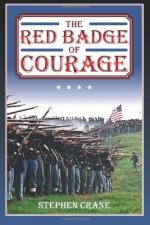|
|
The Red Badge of Courage Topic Tracking: Peer Pressure/Morale
Chapter 1
Peer Pressure/Morale 1: A significant portion of the novel revolves around the reactions of the common enlisted soldiers to each other, and the realities of a camaraderie built by necessity out of war. Rumors play a large role: the soldiers squabble over the truth of a rumor about troop movements, a theme that holds throughout the book.
Peer Pressure/Morale 2: Henry becomes preoccupied with the thought of running from battle, a recurring theme. Henry worries about running, not simply because it would be cowardly, but more specifically, how the act of fleeing would be perceived by his comrades. He fears their ridicule more than he fears letting his country down.
Chapter 2
Peer Pressure/Morale 3: The emphasis is put not on the movement of the troops, but on the perceptions and fears of the men. The morale of the troops is based not on the officers' coaxing, but on the intricacies of events within the common ranks.
Chapter 3
Peer Pressure/Morale 4: This is the first instance in the novel where the individual (Henry's internal struggle and doubt) comes into conflict with the community (the movement of the regiment). Henry loses control of any individual thoughts, and is swept up in the compulsion of the group. This group will takes on an importance in battle that Henry has never realized in all of his visions of individual valor to this point.
Chapter 4
Peer Pressure/Morale 5: The rumors of the men seem ostensibly to go against the reality of the group that says camaraderie is all. The boasts of the men seem to uphold the storybook myth of war - they would never admit that Bill Smithers went to the hospital because he was scared; instead, they maintain that it was an act committed out of some mythical patriotism.
Chapter 5
Peer Pressure/Morale 6: It is the group that becomes the be all and end all of the moment of battle - no idealistic image or governmental goal is at hand. The truth of the moment is in the men being able to stand together as one.
Chapter 6
Peer Pressure/Morale 7: Just as it is the group that creates the medium in which invincible warriors are created, so it is Henry's perception of the group that makes him doubt his strength and run. He runs because everyone around him runs; it is only later that he tries to justify his flight on an individual level.
Chapter 8
Peer Pressure/Morale 8: Again, the social pressure of the situation dictates Henry's reaction; Henry is ashamed of his flight not because he saved himself from harm, but because what he has done does not conform to the societal ideal of how he should have acted.
Chapter 10
Peer Pressure/Morale 9: Although Henry is still ashamed at having no wound to show as proof of his valor, the Tattered Soldier's insistence on asking where his wound is reflects the need that the soldiers have for camaraderie. Even among virtual strangers, it is the notion of companionship that prevails above any individual act.
Chapter 11
Peer Pressure/Morale 10: The fear of derision that Henry feels leads him to attempt to come up with lies about where he was during the battle. What is perceived among the men as the truth, and the relation of that "truth" to the ideal of valor is vastly more important than what actually transpired or the larger governmental "aim" of the war.
Chapter 12
Peer Pressure/Morale 11: Even though Henry has perceived the storybook ideal of a soldier to be of paramount importance, the reaction of Henry's comrades once he is back in camp show that even above the ideal, simple human compassion prevails. Just as in the moment of battle, where the men standing as one creates the invincible warrior, Wilson's tears at Henry's return show that it is simple companionship that keeps the men fighting, and not their perceptions of each other relative to an unreachable ideal.
Chapter 15
Peer Pressure/Morale 12: Though Henry has begun the road to self-acceptance, the power for righteous comparison with Wilson proves irresistible. He feels that he is closer to the ideal for valor because he never acted upon the urge to admit his fear. This is another example of the cyclical nature of Henry's thinking, as he moves toward a sense of "manhood."
Chapter 16
Peer Pressure/Morale 13: With the general acceptance of battle among Henry's regiment comes a stark notion of reality - the storybook ideal has begun to crumble under the weight of what they have witnessed. In the absence of hope among the men, perhaps lies the basis for the bitter sarcasm Henry witnessed among the other veterans.
Chapter 17
Peer Pressure/Morale 14: Although the "truth" of battle lies in the actions of the group, the storybook ideal that the men hold has to do only with the individual. In praising Henry for his individual actions, the group is forgotten. It is the group's actions that allow Henry to be courageous on an individual level, but this is lost in the moment. This is perhaps how reality and the ideal that Henry read about in school become convoluted and the truth of battle covered up.
Chapter 21
Peer Pressure/Morale 15: The Greek-like warrior ideal proves to be an even more elusive thing than the men thought - even in the wake of apparent success and glory, the survivors of the charge still feel guilty and inadequate in the face of those they perceive to be their betters. There is always something left undone and unattainable, which perhaps is what the mocking veterans mean to tell them with their jeers.
Chapter 23
Peer Pressure/Morale 16: Again the societal pressures are evident, this time among the enemy. The last prisoner feels shame not because of impending harm, but because he will be perceived as a dishonored coward.




